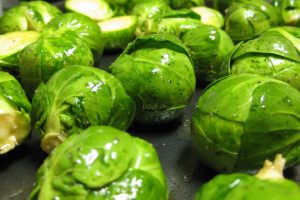Brussels sprouts, but not as you know them

Image credit: Flickr John Sullivan
Love them or hate them they are undeniably good for you. You may remember them from your childhood as being drowned in butter or boiled to mush, but we think it’s time to give the brussels sprout a second chance, after all they are:
- Very low GI – they are digested slowly providing longer lasting energy and don’t cause a spike in blood sugar levels.
- High in Vitamin K & C – Vitamin K helps the blood to clot when you have a cut or open wound and keeping VItamin C levels up suring winter can help boost your immunue system.
- Good source of fibre – foods that are high in fibre help you feel fuller longer and can help with digestive health, the Australian Heart Association recommends that adults consume 25–30 g daily.
- Low in calories and high in nutrients (see below)
Brussels Sprouts, cooked
1.00 cup (156.00 grams) Calories: 56
There is a lot of good packed into each little brussels sprout. It is low in Saturated Fat and very low in Cholesterol. They are also good sources of:
- Thiamin
- Riboflavin
- Iron
- Magnesium
- Phosphorus
- Copper
And a very good source of:
- Dietary Fiber
- Vitamin A
- Vitamin C
- Vitamin K
- Vitamin B6
- Folate
- Potassium
- Manganese
All of the above sounds great, right? But what does any of it mean? Here are reasons why some of the above nutrients are good.
And if you’re still wondering what to do with the brussels sprout for dinner this week, here is a delicious roasted brussels sprout recipe form the Food Network.
Enjoy!
